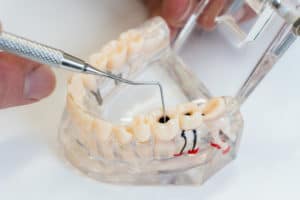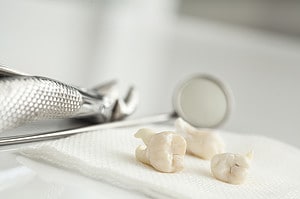‘A stitch in time saves nine.’ This is especially true when it comes to dental crowns. Knowing how to properly care for and maintain your dental crown is essential for a lifetime of healthy, beautiful teeth.
In this definitive guide, we’ll explore the types of dental crowns, how long they last, factors influencing their longevity, signs of a failing dental crown, and how to ensure your dental crown lasts.
Let us begin the journey to a healthy, beautiful smile!
What Is a Dental Crown
Although often overlooked, understanding what a dental crown is is an important part of gauging its longevity. A dental crown is a type of restoration that covers the entire surface of a natural tooth. It can be made of a variety of materials, including metal, porcelain, and resin. Dental crowns are used to protect a damaged or weakened tooth, restore its shape and size, and strengthen its structure. Proper care and oral hygiene are essential for optimising dental crown longevity.
A temporary crown is usually used to cover the tooth, while a permanent crown is made in a laboratory. Permanent crowns typically have an average lifespan of five to fifteen years, depending on how well you maintain your oral health. Metal crowns are the most durable and can last up to 30 years with proper care. Porcelain crowns, on the other hand, are not as strong as metal crowns and may need to be replaced after about ten years.
Regular dental care is essential for making sure your dental crowns remain in good condition and last as long as possible. Regular checkups with your dentist can help identify any issues with your crowns and allow for timely intervention and preventative measures. With proper care, dental crowns can be a great way to protect and restore your teeth and improve your oral health.
Types of Dental Crowns
Exploring different types of dental crowns is essential for optimising their longevity. Dental crowns are a type of dental restoration that helps protect a damaged or decayed tooth from further damage. These restorations also help restore the shape, strength, and appearance of a tooth.
The most common types of dental crowns are porcelain and ceramic crowns, zirconia crowns, gold crowns, and metal alloys. Porcelain and ceramic crowns are typically favoured for their aesthetic appeal, while gold crowns and metal alloys are often chosen for their durability and strength. Composite resin crowns are more affordable and provide a natural-looking solution for restoring the tooth structure.
No matter which type of dental crown is chosen, they can all help protect the tooth from further decay and restore the tooth’s original strength and structure. With proper care and regular dental check-ups, dental crowns can last for years. However, some crowns may need to be replaced sooner due to wear and tear or if the underlying tooth structure changes.
How Long Do Dental Crowns Last
Generally speaking, dental crowns can last for many years with proper care and regular dental check-ups. The lifespan of a dental crown can vary depending on the placement of the crown, the materials used to make the crown, and the price paid for the crown. Quality materials and proper placement of the crown will help ensure that the crown will be strong and last a long time. On the other hand, lower-quality materials and improper placement of the crown can cause the crown to hurt and not last as long.
Cerec crowns, which are made in a single visit, are known to last for many years, while day crowns, which are made in two visits, can last even longer. Ultimately, with proper care and regular dental check-ups, dental crowns can last for many years.
Factors Influencing Dental Crown Longevity
Examining the factors that influence dental crown longevity is essential for ensuring long-term success. From dental visits and insurance companies to the type of crown material and entire tooth structure, there are many components of dental crowns that can affect their lifespan.
First and foremost, harmful habits such as using the teeth to open packages and biting down on hard objects should be avoided to prevent damage to the crown, whereas regular dental visits and excellent oral hygiene habits can help maintain the crown’s integrity.
Additionally, the type of crown material used plays a major role in how long the crown will last. Gold alloy and porcelain are usually the most durable and long-lasting crown materials, whereas metal crowns may be less expensive but can corrode over time.
Finally, the gum tissue around the crown and the entire tooth structure should be kept healthy. Eating sticky food and not brushing properly can cause the crown to become loose, which can lead to further complications.
Adhering to proper dental hygiene and avoiding risky habits can help maintain the longevity of the dental crown.
Signs of a Failing Dental Crown
Knowing the signs of a failing dental crown can be critical for timely treatment and long-term success. For those with a dental crown, it is important to be aware of any changes in the colour or shape of the crown, as well as any pain or discomfort. Other signs that may indicate a failing crown include decayed teeth beneath the crown, a need for a root canal, or a discolouration of the dental crown material. If any of these signs are present, it is important to visit an experienced dentist as soon as possible.
In some cases, a crown replacement may be necessary. It is important to consider the type of crown being replaced, such as a gold crown, when making a decision. Other factors may affect the longevity of the crown, such as the quality of the dental health, the strength of the dental cement, and whether a night guard is worn while sleeping. Allergic reactions to the material of the crown may also affect the crown’s longevity.
How to Ensure Your Dental Crown Lasts
By taking the right precautions, individuals can ensure their dental crowns last for many years. Here are some helpful tips to keep your crown healthy and durable:
- Keep your teeth in good condition by avoiding broken teeth and dental plaque buildup.
- Select a crown made of durable material, such as a composite resin crown or a traditional porcelain crown.
- Schedule regular professional cleanings and use fluoride toothpaste to maintain a healthy, custom crown.
When an individual invests in a dental crown procedure, it is important to take the necessary steps to ensure the crown lasts for many years. Taking the time to care for the crown by protecting it against damage and decay will help maintain its longevity. By following these steps, individuals can ensure their crown remains strong and healthy.
When to Replace Your Dental Crown
It is important to be aware of when to replace your dental crown in order to maintain its longevity. Depending on the crown type, the material used, the condition of the damaged teeth, and how well you take care of your oral health, a dental crown can last from 5 to 15 years. If you have a partial crown, you may need to replace it more often as extra care is needed to preserve it. If you suffer from periodontal health issues, you may need to replace it sooner. When in doubt, it is best to consult with your dentist for a proper diagnosis.
The original tooth must be strong enough to support the crown, and the composite material used to make the crown should match natural teeth in colour and strength. Your dentist will also take digital scans to make sure the crown fits perfectly. In order to promote long-lasting dental crowns, it is important to take extra care of your teeth at night with antibacterial mouthwash and visit the office for regular check-ups. Different types of crowns require different levels of care, so make sure to ask your dentist which type of crown is best for you.
Key Takeaways
Dental crowns are a reliable and long-lasting solution to repair and restore teeth. With proper care and maintenance, dental crowns are capable of withstanding the test of time and can last for many years.
With a few simple steps, such as regular dental check-ups and proper oral hygiene, individuals can ensure their dental crowns remain strong and durable for an almost infinite amount of time – a truly remarkable feat in dental care.
If you need assistance with dental crowns or any other dental care services, feel free to visit our expert team at Aspendale Gardens Dental Care in Aspendale Gardens, VIC. Our experienced and knowledgeable staff are dedicated to providing quality dental care with a focus on restoring and preserving your smile for years to come.











